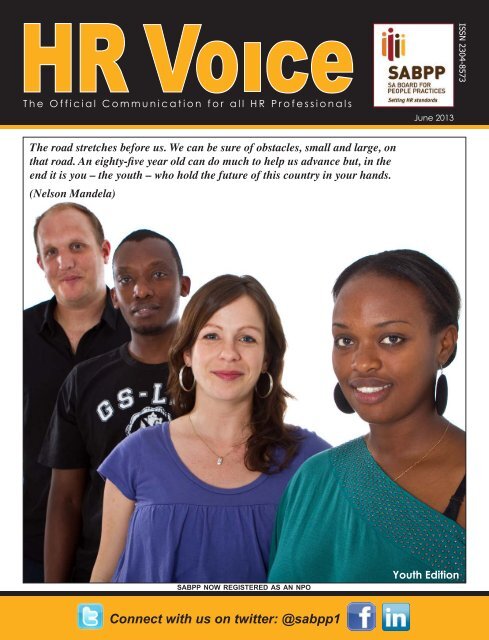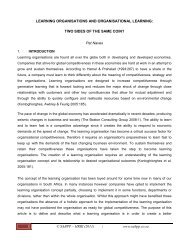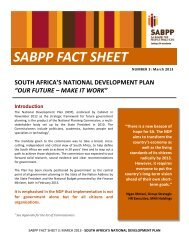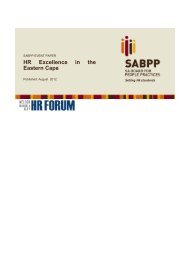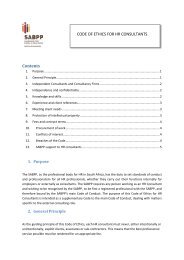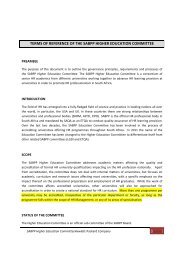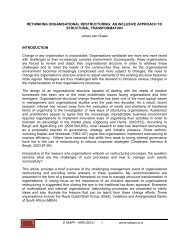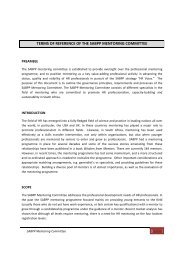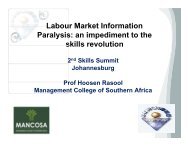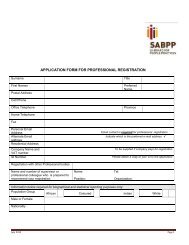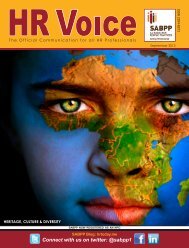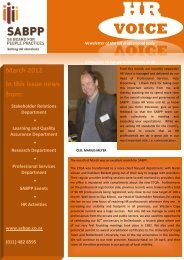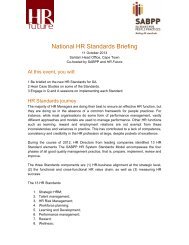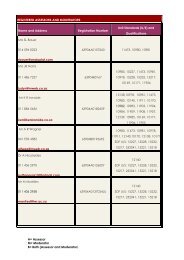SABPP HR Voice FINAL 310513.pdf
SABPP HR Voice FINAL 310513.pdf
SABPP HR Voice FINAL 310513.pdf
- No tags were found...
Create successful ePaper yourself
Turn your PDF publications into a flip-book with our unique Google optimized e-Paper software.
BOARD DESKWelcome to the Youth month edition of <strong>HR</strong><strong>Voice</strong>. We celebrate Youth Month in June.The <strong>SABPP</strong> Exco members are excitedabout June for three major reasons:• We are rolling out the National <strong>HR</strong>Standards Initiative after its launch lastmonth;• Following our successful <strong>HR</strong> internshippilot last month, we are ready for thesecond group of <strong>HR</strong> interns;• The <strong>SABPP</strong> Gauteng committee hasmanaged to arrange two sessions for our<strong>HR</strong> professionals in Johannesburg (4June), and Pretoria (14 June).Marius MeyerCEO of <strong>SABPP</strong>The National <strong>HR</strong> Standards Initiativecharters a new era for <strong>HR</strong> in South Africa by developing thefirst set of <strong>HR</strong> standards for South Africa. The purpose ofthe initiative is to lead and assist <strong>HR</strong> managers in generatingintegrated standards and metrics for the <strong>HR</strong> function alignedto business strategy. <strong>HR</strong> management system standardsare needed to set a national benchmark of good practiceand a consistent way of managing <strong>HR</strong> functions and peoplein organisations. Once the standards are available we willall be implementers of the standards. The <strong>HR</strong> standardsproject will elevate <strong>HR</strong> to the level of other professions andprovide a common platform for driving sound <strong>HR</strong> practiceat all workplaces. We will use the winter season to reviewthe standards that will be available before spring, when anew season and new era for <strong>HR</strong> will emerge – a time forquality, consistency and excellence. We look forward to yourinvolvement on this exciting journey.In addition to our focus on the NationalStandards Initiative, we are excitedabout our <strong>HR</strong> internship which isintended to empower the <strong>HR</strong> youth ofSouth Africa. Some <strong>HR</strong> graduates arestruggling to find work, but our first pilot<strong>HR</strong> internship launched last month wassuch a big success, that we are nowready to implement this programmeat a larger scale. The success of thepilot programme featured in Sowetanand Benoni City Times. We thank theNational Youth Development Agency(NYDA) for funding the project and for <strong>HR</strong>Support Solutions (<strong>HR</strong>SS) for running theprogramme.Students, academics and <strong>HR</strong> Managerswho want to support the programme canapply to participate in this youth development initiative, byvisiting www.hrss.co.za. Graduates can submit their CVsto graduate@hrss.co.za Likewise, employers can contactMargie Harington on (011) 422 3657 or info@hrss.co.za ifthey require an <strong>HR</strong> intern. We also want to acknowledge thesupport of Pauls Gibbons and Kate Dikgale-Freeman fromDNA for taking on an <strong>HR</strong> intern in their consulting business.Moreover, Sakkie van Greunen from the University ofPretoria will conduct his master’s degree research on the <strong>HR</strong>internship programme.Thus, there are some positive initiatives to help us empowerthe youth this month. Let us become involved in <strong>HR</strong>internships and other youth development programmes at ourorganisations and societies to empower our youth - they areour future.10%DISCOUNTTake advantage of a discount for Car HireFor <strong>SABPP</strong> registered members only!(not applicable during peak holiday periods)www.capitalcarhire.co.za3•• Toll free No: (011) 022 5340/1
hrriTHE YOUTH IN NUMBERS: CENSUS 2011The National Youth DevelopmentAgency (NYDA) welcomes the 2011Census results.The Census 2011 results confirm thatSouth Africa is a youthful country withyouth aged 15-34 year constitutingabout 38% (about 20 Million) of thetotal population, which is estimated atabout 51.8 Million.It is estimated that if age 14 and age35 are included in the estimations, thefigure of youths as a proportion of thetotal population will go up to about 42%(about 21.7 million). In fact, the averageage of Census 2011 is 25 years.About 26% of youth reside in Gauteng,followed by KwaZulu-Natal withabout 20% of the youth. The restof the figures are as follows, 11.4%(Eastern Cape), 11% (Western Cape),10% (Limpopo), 8% (Mpumalanga),6% (North West), and 2% (NorthernCape).In terms of race, African youth constitute about 82% of the youth population,followed by Coloured youths at about 8%. White youth constitute about 6% ofthe youth population while Indians constitute about 2%. Gender distribution ofyoung people is at about 50% for males and females.PERCENTAGE DISTRIBUTION OF YOUTH (15-34) BY RACE, 2011The big proportion of youth populationcalls for intensification of efforts todevelop young people. An investmentin young people will have positiveeconomic spin-offs in future.Census 2011 has also confirmed thehigh level of unemployment amongyoung people. Young people betweenthe 14 and 19 are the most affectedwith 64.9% being unemployed. Thisis followed closely by those agedbetween 20 and 24 years with anunemployment rate of about 49%. If anexpanded definition of unemploymentis used, the unemployment figuresincreased to 78% for those agedbetween 15 and 19 and to about 60%for those aged 20 to 24 years.These figures compare unfavourablywith the national unemploymentfigures, which stand at about 30%(narrow definition) and about 40%(expanded). This by any standard is anindication of a crisis which needs to bedealt with urgently.4
advertorial26TH ANNUAL LABOUR LAW CONFERENCE – 30TH JULY - 1ST AUGUST 2013 – JOHANNESBURG26th Annual Labour Law Conference delves into the implications of employment, the economy & growth on labour lawThe Annual Labour Law Conference,jointly organized by The Institute ofDevelopment and Labour Law, Universityof Cape Town, Centre for Applied LegalStudies, University of Witwatersrandand The Faculty of Law, University ofKwaZuluNatal will be celebrating its 26thconference in August 2013. This year’stheme is of “Employment, the Economyand Growth: Implications for LabourLaw” promises to delve into some of themore pressing issues facing the industryat the moment.The world is experiencing a protractedeconomic crisis and South Africa hasnot escaped its impact. The muchneeded economic developmentand growth are dampened by thesedevelopments and opportunities fornew businesses, investment andemployment are restricted. It is criticalparticularly in view of the officialunemployment rate which continues tohover at the 25% mark that the SouthAfrican economy and labour marketrespond to these realities and developtools to address these challenges.The 26th Annual Labour LawConference will get to grips with theserealities and plenary sessions willexamine the relationship betweenemployment, the economy and growth;the impact of upheavals in the miningindustry on that industry and the SouthAfrican economy in general; and willengage with the interface betweendecent work and job creation andexamine the nature and true social andeconomic cost of strikes. In additionthere will be 12 workshops, 2 of whichwill be repeated, covering issuesrelating to the main conference themeand recent developments in the labourmarket and employment law.Plenary speakers include the Governorof the Reserve Bank, Ms Gill Marcus,Ms Fatima Hassan, Dr Elize Strydom,Professor Jeremy Seekings, ProfessorHalton Cheadle and Mr Andrew Levy.The Conference will be opened byMr Justice Basheer Waglay, JudgePresident of the Labour Appeal Courtand the Honourable Mildred Oliphant,Minister of Labour will present theMinisterial Address. Workshoppresenters include Mr Sbu Gule, MrCraig Bosch, Adv Kathy Idensohn,Professor Avinash Govindjee, Mr AadilPatel, Professor Simon Deakin, MsBenita Whitcher, Mr Afzul Soobedaarand Ms Shamima Gaibie.The Annual Labour Law Conferenceis a sound investment of your valuabletime. With special rates for EmployerOrganizations, CCMA, Trade Unions,Bargaining Councils and Academics,the conference is accessible to allkey players in the fields of labour law,industrial relations and human resources,giving you an opportunity for extensivenetworking.Contact LexisNexis for more information on this event:Email seminars@lexisnexis.co.za • Fax 086 682 6461 • Tel (031) 268 32555
hrriTHE YOUTH IN NUMBERS: CENSUS 2011<strong>SABPP</strong> PARTNERS WITHBUSINESSBRIEF MAGAZINE<strong>SABPP</strong> is proud to announce that,as a professional service benefit,we have negotiated online copiesof BusinessBrief magazine at nocharge, on an ongoing basis.This falls in line with the fact thatBusinessBrief has been accreditedby <strong>SABPP</strong> for CPD/E (ContinuingProfessional Development/Education) purposes.For your information, BusinessBriefis a Business ManagementMagazine that provides decisionmakersin business with theinformation they need to makebetter business decisions.There are ten regular sectionsthat contain articles dealing withthe management issues thataffect and influence businessdecision-making.In order to take advantageof this offer, please clickon the following link:CLICK HEREhttp://www.bbrief.co.za/voucherand then insert the followingvoucher number: SBjJ13NOTE: This voucher is only validuntil 31 July 2013Although the country is stillconfronted by quality issues ineducation, the NYDA also welcomesthe fact that the level of participationin education has increased. Schoolattendance has increased across allracial groups.The percentage of people withoutany schooling was at 19.1% in1996 and it declined considerablyto 8.6% from 1996 to 2011. Thepercentage of those with highereducation qualifications increasedfrom 7.1% in 1996 to 11.8% in 2011.The biggest issue though is poorretention and throughput at basic andhigher education as well, NYDA hasanalysed this in the Youth Context:The Young Generation manuscriptand the findings through thisCensus concur with findings there.Many young South Africans areilliterate and not well trained to takeup employment opportunities orentrepreneurship opportunities andthat is a huge concern.Household statistics have animplication on young people as theycould be used as an indicator ofwhat basic services young peopleare able to access in the householdsthat they live in. Young people arelocated in households and theyconstitute a considerable proportionof the population. Therefore, anyfactor that either impacts negativelyor positively on households is likely to6have a considerable impact on youngpeople.At the households level, Census 2011show considerable improvementswith more households living in formaldwelling (about 78% compared to65.1% in 1996 and 68.5% in 2001)),having access to piped water (about91% compared to 80.3% in 1996and 84.5% in 2001), flush toilets(90.6% compared to 82.9 (1996)and 82.3% (2001), electricity (about85% compared to 58.2% (1996) and51.5% (2001).These shows a positive improvementfrom the 2001 figures as there is aconsiderable increase in access tobasic services.Although there is an improvement alot still needs to be done, especiallyin rural provinces like Limpopo andthe Eastern Cape where level ofaccess to basic services and facilitiesis relatively low compared to theother provinces.The Census 2011 still show racialinequalities in South Africa, withAfricans and Coloured beingthe highest affected by poverty,unemployment, limited access tobasic services, etc. Whites andIndians are the most privileged withbetter education and high incomes.On average, a households headedby a white person have an income ofcontinued...
hrriAMMUNITION FOR <strong>HR</strong> PROFESSIONALS TO DEAL WITH THE DANGEROUS WEAPONS BILL2012 proved to be a year tainted notonly with increased industrial action,but increased levels of violence duringindustrial action. In many instances,strikers carried either axes, assegais,knobkerries, pangas or sticks or all ofthose instruments. Intimidation of fellowworkers, assaults on managers and evenarson were regular features of industrialaction during 2012. The South AfricanPolice Services on the whole have beenreluctant to take the necessary stepsto deal with those strikers who commitcriminal acts during strikes or protests.In order to attempt to curb the violence,a revised Dangerous Weapons Bill waspublished for comment towards the endof 2012. The Bill now seeks to prohibitthe carrying of any ‘dangerous weapons’in public. A dangerous weapon is definedby the Bill as ‘any object, other thana firearm, designed as a weapon andcapable of producing death or seriousbodily harm’. Both a firearm and imitationfirearm are defined by the Bill. Despitethis, the definition of ‘dangerous weapon’does not take into account weaponssuch as knobkerries or pangas, both ofwhich are readily used by workers duringindustrial action.The Bill aims to create a criminal offenceof being in possession of a dangerousweapon or firearm under circumstanceswhich may raise a reasonable suspicionthat the person intends to use thedangerous weapon or firearm for anunlawful purpose. Such a prohibitionalso extends to the possession of animitation firearm. The proposed sanctionfor contravening this provision is a fine ora period of imprisonment not exceedingthree years.The Bill also seeks toamend the Regulation of Gatherings Act,1993 by prohibiting the carrying of anyfirearms, imitation firearms or dangerousweapons by participants in a gathering ordemonstration in terms of the Regulationof Gatherings Act. Those dangerousobjects may only be carried during agathering or demonstration if it has beenapproved prior to the commencementof such a gathering by the responsibleofficer. They may also be carried duringhistorical enactments and for cultural orreligious purposes.While the Bill commendably attemptsto address issues of weapons beingbrandished during public gatherings, itneglects to extend such a prohibition tostrikes and industrial action. Whethersuch an omission was deliberate or notis debatable, since the Labour RelationsAmendment Bill is due to be signed intolaw later this year. Those amendmentsdo not address the issue of violenceduring strikes and one would haveexpected the Dangerous Weapons Bill todeal with this issue.South Africa’s constitutional democracypermits employees to strike in supportof their demands in respect of mattersof mutual interest. Employees aretherefore permitted to strike and shouldexercise that right responsibly and inaccordance with the Labour RelationsAct, 1995. While the Constitutionprotects the right of employees to strike,strikes should be peaceful and shouldnot infringe upon the rights and/or safetyof others.There appears to be no reasonable orrational basis for only making the Billapplicable to ‘gatherings’ as defined inthe Regulation of Gatherings Act. Violentacts have been perpetrated by strikers inrecent years and accordingly measuresshould be put in place to prevent such11violence from occurring during industrialaction in the future.The distinction drawn betweengatherings and strikes is thereforearbitrary in our view.We recommend that a provisionshould be inserted dealing with themisconduct of striking employeeswho routinely carry sticks, assegais,axes and other objects as weaponsnot only to further the objectives ofthe strike by attempting to intimidateemployers but also to intimidatenon-striking employees. On severaloccasions, and increasingly during2012, several acts of violence andvandalism were perpetrated byemployees who wielded ‘dangerousweapons’ as defined in the Bill. Suchconduct should also attract a criminalpenalty, similar to the one mentionedabove.While the Bill should be commended, itfalls short of the mark on several issues,most notably the failure to regulate theposition in respect of industrial action.It remains to be seen whether theBill will be amended further before itfinally comes into effect. One thing iscertain though – Government will haveto take steps to address the levels ofviolence which are becoming endemic toindustrial action and the SAPS will haveto re-think its role in relation to dealingboth with strikers who carry weaponsand those strikers who act in a violentmanner.Rod HarperPartner, Cowan-Harper AttorneysNeil CoetzerAssociate, Cowan-Harper AttorneysIn thanks from the <strong>SABPP</strong> to Cowan-Harper Attorneys for this article, we are pleased to inform our members that Cowan-Harper Attorneys will be holding a Labour Law Update on Wednesday, 19 June 2013 at the FNB Learning Centre, Sandton.The Conference will deal with the latest industrial relations and employment law trends, new statutes impacting on theworkplace and case law developments. For further details please contact Delene Swart: dswart@wecan.co.za,tel: 011 783-8716, fax: 011 783-8716. SEMINAR FEE: R1 400, 00 PER DELEGATE (plus VAT of R196.00); R 1 200, 00PER DELEGATE IF MORE THAN 2 DELEGATES FROM THE SAME COMPANY (plus VAT of R168.00).
professional servicesNEW INITIATVE LAUNCHEDTO ENCOURAGE BUSINESSESTO EMPLOY YOUNGSOUTH AFRICANSA trio of a law firm, media firm andan employee incentive company hascombined to launch a platform similarto Proudly South Africa, to encouragebusinesses to employ young SouthAfricans. Companies would register onthe index to show support, be able touse the logo and are then also able tocompete for the most favourite youthemployer at the annual awards dinner.The suggested criteria will be thefollowing:• Skills Development Initiatives,• Bursaries,• Internships,• Internal mentorship• Corporate Social InvestmentOpportunities• Young people in managementpositionsFor more details:www.yeindex.org orcontact info@yeindex.orgPRINTED FROM BUSINESS DAY, MAY 8TH 2013EDUCATION SHOULD BE AFRICA’S HIGHEST PRIORITYBy Mo Ibrahim, founder and chairman, Mo IbrahimFoundation; founder, Celtel International; co-chairman,World Economic Forum on Africa 2013.Wherever I go, I find myself askedabout the unique opportunity thatAfrica’s rich natural resources offerfor our future. I quickly agree thatAfrica has remarkable resourceswhich, properly harnessed, can helpdeliver widespread prosperity.But I am not talking about oil, naturalgas or precious minerals, importantas they are for our continent’sprospects. I have no doubt thatAfrica’s greatest gift is the talent andenergy of our young generation.Our continent is in the middle of anextraordinary demographic shift.The median age of our populationis now 18, seven years youngerthan in south Asia and 16 yearsbelow China. These young peopleshould form a powerful motor foreconomic growth in Africa, and, asour continent prospers, globally.They should also provide a hugepotential consumer market for goodsand services. It is no wonder thatcompanies and investors worldwideare beginning to see Africa in apositive light.And it is not just these extraordinarynumbers which should excite us.Because it is clear that so far we arenot living up to this challenge.The statistics are stark. Economicgrowth has been strong, with nearlyhalf of African countries, accordingto the World Bank, reaching middleincome status.Yet youth unemployment continuesto rise worryingly. Africa is makingreal progress in getting its childreninto school. But the figures show thatthe longer our young people stay ineducation, the less chance they haveof being employed.We know, too, that agriculture is, byfar, the continent’s biggest employerand vital in tackling hunger anddriving wider development. Yet lessthan 2% of our young people arestudying agriculture.Africa also has the lowest proportionof engineers in the world – a matterof great concern given the role theextractive industries play in manyeconomies.These failures risk holding backAfrica’s positive trajectory and we arein danger of letting down the mosttalented generation in our continent’shistory.Whenever I meet young Africans,I come away impressed with theircreativity, ambition and drive. Sowhen the World Economic Forummet in Cape Town to discuss how todeliver on Africa’s promise, I wantour discussions to centre on whatwe can do to get the best out ofour greatest resources – our youngpeople.There is no single solution to this.Nor can it be solely the responsibilityof governments. In fact, I believestrongly that education is tooimportant a subject to be left onlyin the hands of politicians andadministrators, no matter how wellintentioned.After all, the principal aim ofcontinued...12
professional servicesEDUCATION SHOULD BE AFRICA’S HIGHEST PRIORITY continued...education is to lead to worthwhile and productiveemployment.It is the private sector that must provide the majority of thenew jobs Africa needs. So we need business to becomemuch more involved in deciding the knowledge and skillstaught in school – and for policy makers to listen whenshaping education and training programmes.We need, for example, a much heavier emphasis onscience, data and innovation. This increased focus will beginto help us meet the continent’s shortfall in engineers.As well as ensuring that school and college better equip ouryoung people with the skills employers need, we need to domore to provide them with careers.This, again, places a new responsibility on business toprovide employment opportunities and training.We need to work together to find ways to stop the brain drainwhich sees our brightest students leave to work abroad.Finally, agriculture must be made more attractive to youngpeople. We have to raise their sights from seeing agricultureas a dead-end, short-term job to one which offers theopportunity to build long-term careers, grow businesses anddeliver prosperity.This requires a greater emphasis on agriculture – amuch wider sector than just farming – in schools, andmore conversations about the opportunity for innovation,entrepreneurship and business development it offers.After all, we know from Asia that agriculture is the bestpossible driver of sustainable growth and development.We need the energy and capacity to innovate the youngergeneration if we are to follow Asia’s lead.If we are to accelerate Africa’s remarkable progress andensure it reaches every community, we must give our youngpeople the chance to thrive.
professional servicesTAKING PROACTIVE ACTION AGAINST COLDS AND FLU IS MORE IMPORTANT THAN EVERIn order to address these health risks,the Kimberly Clark Professional*HEALTHY WORKPLACE PROJECTwas developed to educate andencourage employers to help their staffreduce the risk of cross contaminationof germs in typical office hot spotssuch as desks, boardrooms, receptionareas, canteens and other high trafficareas, through a simple wash, wipeand sanitise protocol that ensuresmaximum protection, all day longthroughout the workplace.THE HEALTHY WORKPLACEPROJECT comprises a simple threestep process, namely;1. Workplace Site Assessment:Businesses who are interestedin learning more about where itspeople are most vulnerable to thespread of germs in their offices willbe offered the opportunity to receivea comprehensive assessment oftheir whole working environment,from reception desks to individualworkstations. Following this visit,the HEALTHY WORKPLACEPROJECT* team will make tailoredrecommendations on where to placeproducts such as hand sanitisers anddesk wipes.2. Installing Kleenex BrandedHygiene Products:With advice and practical support, theKimberly Clark Professional* teamwill help customers to install the bestpossible hygiene systems aroundthe workplace and, most importantly,inspire staff to use them regularly- steps that could help prevent thespread of germs that cause a range ofillnesses.3. An Interactive CommunicationCampaign:In addition, companies who takeadvantage of the assessment willreceive an engagement activationpack comprising a whole range ofinternal communication material, allcarrying information and messagesabout workplace hygiene. Thematerials in the pack have beencarefully designed to attract theattention of employees, and persuadethem to use the hygiene productsmade available by their employer,helping to achieve a long-term positivechange in their behaviour.Malope points out that the three stepprocess is easy to implement, and isdesigned to create a more hygieneconscious,motivated and engagedworkforce.“Statistically only 52 percent of menwash their hands after using thebathroom. Therefore, germs are notfought in the restroom. In creating ahealthy workplace, employers shouldencourage and make available properhand hygiene solutions in the areaswhere employees actually work.”In addition, disinfectant wipes areprovided to ensure that the germs onkeyboards, desks and other surfacesare effectively eliminated. “Companieswill benefit from having a programmethat will help them manage the risk ofcross contamination of viruses in theirorganisation, ultimately ensuring theimproved health of their employees,”he concludes.Kimberly Clark Professional* South Africa is a subsidiary of the US-based Kimberly Clark Corporation, which employs morethan 57 000 staff members in 36 countries. With more than 140 years of industry expertise and a total of US $20, 8-billion inworldwide sales in 2011, Kimberly Clark’s extensive range of leading brands are sold in more than 175 countries worldwide.These include; Kleenex, Huggies, Babysoft, Carlton, Kotex, Scott, Kleenguard and Wypall.Ryan Collyer, NGAGE Public RelationsPhone: (011) 867-7763, Fax: 086 512 3352, Cell: 072 377 5000 Email: ryan@ngage.co.za, Web: www.ngage.co.za15
professional services<strong>HR</strong> CHIEFS SET NATIONAL <strong>HR</strong> STANDARDSOn 21 May, a hundred <strong>HR</strong> directorsand eight <strong>HR</strong> professional bodies andassociations gathered in Johannesburgto set <strong>HR</strong> standards for South Africa.This is a national initiative driven by the<strong>HR</strong> quality assurance and professionalbody, the SA Board for People Practices(<strong>SABPP</strong>) and supported by <strong>HR</strong> Future.The project initiated from the realisationthat other parts of the business likeproduction, accounting and engineeringhave clear standards, while there was atotal absence of <strong>HR</strong> standards.Although most <strong>HR</strong> managers are doingtheir best to ensure an effective <strong>HR</strong>function, they are doing so in a vacuum,given the lack of a common frameworkfor people practices. For instance,while most organisations do some formof performance management, vastlydifferent approaches and models areused to manage performance. Other <strong>HR</strong>functions such as learning, reward andemployment relations are not exemptfrom these inconsistencies and variancein practice.Clear, formal <strong>HR</strong> Standards will takethe practice of <strong>HR</strong> to a new level ofrelevance, significance, excellence andcredibility. This is exactly what <strong>HR</strong> needsin order to play its rightful role. Theproject is writing a crucial chapter in thehistory of <strong>HR</strong> in South Africa.The <strong>SABPP</strong> delegates from leadingcompanies generated 13 <strong>HR</strong> standardelements (for example for workforceplanning, training, performancemanagement and so forth); this will befollowed up with tangible <strong>HR</strong> metrics,as well as standards for integratedreporting. The summit was facilitated byDr Michael Robbins, Managing Directorof IMOR (UK). Michael asserted: “SouthAfrican <strong>HR</strong> Directors are leading theworld after today, there are six groupsdoing this work globally, but you are atthe forefront of setting <strong>HR</strong> standards.”Siphiwe Moyo, chairman of <strong>SABPP</strong>opened the summit and said: “Thisproject is the most profound national <strong>HR</strong>project in South Africa ever.Setting proper <strong>HR</strong> standards for SouthAfrica will not only raise the level ofprofessionalism in <strong>HR</strong>, but will alsoimprove the quality of people practicesin organisations.”One delegate added: “This was thebest day in my <strong>HR</strong> career. After today Iam proud to be in <strong>HR</strong>.” David Bischof,chairman of the Assessment CentreStudy Group summarised the dayas follows: “An exciting, invigoratingand intellectually stimulating day withfantastic colleagues.” Stan Horwitz,a board member of the South AfricanOrganisation Development Networkdescribed the event as an “outstanding,groundbreaking summit.” Selinah Seipei,an <strong>HR</strong> intern at DNA said: “I had the bestday of my life. History was made todayand I’m honored to be part of it.”The <strong>SABPP</strong> <strong>HR</strong> System StandardsModel encompasses the four phasesof all good quality managementpractice, i.e. prepare, implement, reviewand improve. The three standardscomponents are <strong>HR</strong>-business alignmentat the strategic level, the functional andcross-functional <strong>HR</strong> value chain, as wellas measuring <strong>HR</strong> success.Within these three standardscomponents, the 13 <strong>HR</strong> standardselements generated are as follows:1. Strategic <strong>HR</strong>M2. Talent management3. <strong>HR</strong> Risk Management4. Workforce planning5. Learning & Development6. Performance management7. Reward8. Wellness9. Employment Relations Management10. Organisation Development11. <strong>HR</strong> Service Delivery12. <strong>HR</strong> Technology13. <strong>HR</strong> MeasurementA total of 13 groups were formed forsenior <strong>HR</strong> professionals to generatethe standards. They were assigned todevelop the standard based on threecomponents: A clear definition of whatthe standard element means, theobjectives of the standard, as well asthe implementation of the standard inpractice.What next? <strong>SABPP</strong> and <strong>HR</strong> Futurewill continue to engage with the <strong>HR</strong>professional community. <strong>HR</strong> directorsand managers are welcome to liaisewith <strong>SABPP</strong> over the next two monthsas we finalise the first draft standard andpractice notes. Let us reconvene on 20August to launch the first national <strong>HR</strong>standard. As <strong>HR</strong> professionals, we oweit to our clients, and other stakeholderswithin and outside our organisations todrive a framework for high quality <strong>HR</strong>work. <strong>SABPP</strong> will drive this processand stay in close contact with the<strong>HR</strong> community in ensuring that theyare involved in the generation of thestandards, as well as supporting themwith the necessary capacity-buildingwhen applying these standards inpractice.Already 11 universities have committedto develop their curriculums based onthe output of the National <strong>HR</strong> StandardsInitiative. Thus, we have influenced thenext generation of the <strong>HR</strong> talent pipelinewith a new <strong>HR</strong> standards frameworkfor South Africa. I thank <strong>HR</strong> Future,and all participants and other interestedparties for joining <strong>SABPP</strong> on the journeytowards <strong>HR</strong> excellence in South Africa.Marius Meyer is CEO of <strong>SABPP</strong>. For regular updates about progress on the National <strong>HR</strong> Standards Initiative,contact him on marius@sabpp.co.za or follow <strong>SABPP</strong> on twitter @<strong>SABPP</strong>1. Website: www.sabpp.co.za16
learning & quality assuranceUPDATE ON <strong>SABPP</strong> WORKSHOP<strong>SABPP</strong> Learning and QualityAssurance team invited SAQA andQCTO on a planned 1st Regionalroadshow throughout the country. Thetopics raised had a direct impact onwhat <strong>SABPP</strong> wants to implement andshare knowledge with its members andtraining providers and the general <strong>HR</strong>Industry.These 10 workshops in 8 provincesattracted 589 people ranging fromuniversity academic and trainingproviders, <strong>HR</strong> practitioners, FETColleges, assessors and moderators,students and consultants. All workshopvenues were sponsored by therespective universities <strong>HR</strong>/IndustrialPsychology faculties. All sessions wereAUDITING OFTRAINING PROVIDERSThe <strong>SABPP</strong> Learning and QualityAssurance (LQA) Department willcommence its fact finding to prepareit’s auditing of its training providers. Aformal letter will be send to all trainingproviders who are required to providecertain information (deadline 5th June)which will be used for updating SAQA,NLRD, QCTO website and <strong>SABPP</strong>Records.Based on the above information a formalschedule (commencing July – November2013) will be sent as well as displayedon website to all training providers for aformal site visit. The training providerswill carry this cost including travel andaccommodation (where possible).opened by a <strong>SABPP</strong> ProfessionalMember. Every delegate receiveda CD with a range on content; theprinting cost was sponsored (70%) byOrganisational Development Institute.Every attendee will get ContinuingProfessional Development (CPD)Certificates copies of presentationsand 10% DISCOUNT COUPON witha car hire company “CAPITAL CARHIRE” valid for 6 months. LabourVision in alliance with Capital Car Hiresponsored the use of their car whentravelling for workshops.We also launched “Student Chapters”were possible, to create a future <strong>HR</strong>Pool for South Africa.17ASSESSORS ANDMODERATORSFor the past 2 months we haveapproved 7 Assessors and 5Moderators. They are located in NorthWest, Johannesburg, Cape Town andPretoria.We will be launching a special skillsprogramme (either CPD basis or creditbearing) over a period of 4 days inJuly (8th onwards) and August (5thonwards) covering:1. Design outcome based learningprogrammes2. Design and develop outcome basedassessmentWe believe these skills will help growthe competency of the constituentassessor/moderators. You cancontact Naren@sabpp.co.za orKathleen@sabpp.co.za regardingthis workshop.APPROVAL OF TRAININGPROVIDERSThe Board has approved 2 new trainingproviders:1. Phungwayo People DevelopmentResource.2. Sharp Edge Consulting & Training ccWhose prime focus is to provide skillsprogrammes addressing management,leadership and change managementbest practices.
learning & quality assuranceInnovation<strong>HR</strong> TODAY BLOG IS LIVE!Good news is that the <strong>SABPP</strong> blog,<strong>HR</strong> Today has been launched on 2May. Please join us on hrtoday.me fordaily news and discussions about <strong>HR</strong>.POLICE TO TACKLE SKILLSDEVELOPMENT<strong>SABPP</strong> CEO, Marius Meyerattended a breakfast session withGeneral, Riah Phiyega, NationalPolice Commissioner, the rest ofthe police top management, as wellas seven SETA CEO’s. All partiesagreed to assist the police with skillsdevelopment.On September 17, 2013, BlackBarkProductions in partnership with the<strong>SABPP</strong> will launch the CelebratingDiversity Conference with the byline‘The value of the Individual’. In doingthis, we aim to highlight the power oftrue diversity - gaining value from thedifferent minds and styles of people nomatter what their races and genders.The main aims of this conference are to:1) demonstrate best practice across allindustries and encourage debate anddiscussion about some of the keyissues at the moment.2) Highlight just how far South Africahas come in the past 20 years andsome of the great initiatives in placethroughout the business world.3) Respond to the upcomingEmployment Equity regulation andupdates.We are hosting this Conferencetoday as we believe that the term‘diversity’ has gained a bad reputationin the business world and we want tohighlight the many positive things thathave been achieved post 1994. Webelieve it is imperative that each andevery individual’s contribution withina team is recognised, along with theexperiences that have brought themthere.We believe that with so many systemsCELEBRATING DIVERSITYand procedures streamlining bothwithin and across industries, peopleare one of the best ways to differentiatean organisation from the rest of thecompetition – and we will be lookingto uncover some of the latest thinkingon the best way to bring that uniquecompetitive edge to the country.Current speakers include:• Prof Shirley Zinn (ex Deputy GlobalHead <strong>HR</strong> : Standard Bank)• Marius Meyer (CEO : <strong>SABPP</strong>)• Rose Nkosi (GM Transformation :Sasol)• Dionne Kerr (Vice Chair : NABC)• Dr Shane Hodgson (VP OD : GoldFields)• Dr Marko Saravanja (Chairman &Founder : Regenesys BusinessSchool)• Pearl Maphoshe (Group HumanCapital Executive, Chairperson of the<strong>HR</strong> Forum : Massmart)• Lindiwe Zikhali (Head ofTransformation & Regulatory Affairs :Anglo American)• IBM – name to be confirmed• KPMG – name to be confirmed• DTI BEE DirectorateFor more information on sponsoring orattending, please contact Laura Barkeron laura@celebratingdiversity.co.za,call 021 821 9922 or visit the website atwww.celebratingdiversity.co.zaSponsored by Anglo American and Progression18
eventsORGANISATIONS ARE GOINGGREEN – OR ARE THEY?WESTERN CAPE BREAKFASTCongratulations to the <strong>SABPP</strong> Western Cape Committee for hosting its firstbreakfast session on 24 May. Well done to Zuko Mlonyeni, <strong>SABPP</strong> Chairmanin the Western Cape and team.THE BEST ADVICE CONVENTION18 JUNE 2013 AT EMPERORS PALACESPREADING IDEAS THAT PUSH SOUTH AFRICANS FORWARDAt Mapoko Research International weare very excited to be organizing the firstannual The Best Advice Convention tobe held at Emperors Palace on 18 June2013. The month of June in South Africais the Youth Month.A number of youth events take placeduring this month and these events tendto focus on 3 areas – political events –naturally (remembering the brave youthof 1976 and focusing on the challengesfacing the youth of today), sportingevents and entertainment.Now South Africa needs a premiumbusiness gathering for its bright youngminds to share ideas that can pushour nation forward. The Best AdviceConvention is a gathering of SouthAfrican professionals and entrepreneursbetween the ages of 18 and 45.South African companies are sendingprofessionals as delegates to thisgathering. On 18 June 2013 SouthAfrican leaders from governmentand business are once againcoming together to inspire, empowerand to interact with South Africanprofessionals and entrepreneurs –producers and contributors to oureconomy.This is an invitation to your organizationto select and send a delegation ofprofessionals to The Best AdviceConvention. Tickets are available andseating is limited.Tickets Cost R2 500 (Ex Vat) P/PMRI Conference Organizing team:www.thebestadviceconvention.co.zaAuthor & Public SpeakerSiya Mapoko072 644 5156 / 011 784 1720siya@siyamapoko.comConvention DirectorClare James082 358 9551 / 021 786 1198/4119clare@siyamapoko.comMedia DirectorFaith Feni072 212 5878 / 021 786 1198/4119faith@siyamapoko.comProject DirectorStefan Gennrich079 969 8758 / 021 786 1198/4119stefan@siyamapoko.comDiscountCapital Car Hire.Please see their ad on page three.As we mark World EnvironmentDay on June 5th more and moreorganisations are adopting greenstrategies for products, manufacturingprocesses, logistics and buildingconstruction/maintenance.However, the findings of the surveyinto environmental practices ofcompanies conducted by the <strong>SABPP</strong>and ImprovID are that to a largeextent organisations are not walkingthe talk in their green practices.Although some leading organisationshave excellent practices to formulateand implement green strategies,others fail to live up to the image theytry to project.The survey, conducted towards theend of 2012, attracted a responsefrom <strong>HR</strong> professionals in 68organisations ranging from the verylarge to the very small, in all industrysectors, and in total representing1.2m employees.There is a missed opportunity for <strong>HR</strong>professionals to contribute towardsthe organisational culture changewhich is necessary if green strategiesare to be fully implemented. Surveyrespondents could easily identifyseveral ways in which the <strong>HR</strong> functioncould make a difference – fromselection processes to training anddevelopment to change management.But too often the <strong>HR</strong> function is notasked to contribute in this area.The survey report provides excellentguidance for organisations and <strong>HR</strong>professionals on good practices tosupport the implementation of greenstrategies. The <strong>SABPP</strong> is seekingsponsors for the production of thereport CDs and a breakfast launch.If your organisation is interestedto sponsor us, please contactKenneth@sabpp.co.za.19
eventsWE LOOK FORWARD TO MEETING YOU AT THESE EVENTS20


